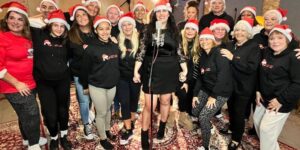Digital Connectivity is often said that it should be a human right whether it be to connect with others, access vital services such as benefits or to hear news and to get involved in their community. To try and help resolve any issue, it’s important to speak to the people experiencing any inequality to get to the root cause.
That’s why community projects are vital to engage people in a peer to peer way because the experts are the ones with lived experience.
And organisations which work within communities need to use a ground up approach ensuring that they hear the voices of those they serve.
Co-production and co-creation
This approach finally has a name for it, but it’s much more than a popular buzzword.
It’s important that we create conversations and work alongside people when starting and developing services rather than simply “doing” to them.
As an example of working with people WDHCS charity ran ‘What’s Up Wakefield District’ research project by training and empowering community interviewers to be paid to ask questions of people in their community about issues that matter to them.
You can read Dan’s experience of being a community interviewer here: https://www.yorkshirefamilies.co.uk/2022/06/13/what-is-community-interviewing-and-how-it-can-help-your-area-life/
The three areas of priority need that the community research found were: households on the edge, children and young people and connectivity.
Without this peer-to-peer interviewing, it would be easy to look at already available statistics and data to analyse it rather than hearing from the people impacted themselves.
Qualitative data can then be transformed into more comprehensive quantitive research. Rather than just going on the number of people on benefits or on a certain health statistic eg the number of obese people, instead it looked at the root cause, which is essential to be able to actual improve someone’s health in the long term. Or how and why lack of digital connectivity can really impact people’s life and their inability to access services and feel connected.
As with any good collaborative project with an organisation and community – it’s important to evolve.
After being inspired as a trained community interviewer (WDHCS), community reporter (People’s Voice Media) and Conversationalist (Wakefield Council). Incidentally on all projects I have worked in them and on them as a member of the community and working as a facilitator/accessibility support.
As part of the social enterprise I founded Sparkle Community Media CIC, I wanted to combine all the skills to develop community influencers an ongoing project where people learn communication skills, digital content creation, journalism/storytelling, community engagement/cohesion, inclusivity, accessibility, equity, social media, social entrepreneurship and marketing.
There will be comprehensive training so people can achieve a community influencer pass as well as accessing ongoing training in specialist skills such as public speaking, photography, specialisms of interest and project specific training. There will be opportunities to work, volunteer, be an apprentice or a social entrepreneur themselves.
Their core role includes:
- Community Journalism
- Community Cohesion (when community is working together- people all coming from the same attitude to it but often not the case) and engagement (engage community)
- Interviewing/ communicating with communities
- Reviewing/ evaluating the results of projects and inviting people to develop next steps
- Being part of a community influencer community to inspire and develop further projects and
- Sharing their lived or professional experience where they want to
Kath Lindley, CEO of WDHCS said:
“We are committed to levelling up the health of people across Wakefield district and reducing disparities, not only through funding, but more widely through our funding partnerships.
“For this grant round the majority of bids came from areas with the highest deprivation in the Southeast of the district. Key themes emerged around mental health, social isolation and children and young people.
“These bids have mirrored the early findings of our ‘What’s Up Wakefield District’ research project and the three areas of priority need: households on the edge, children and young people and connectivity.
“We look forward to sharing our research findings in depth, along with our new funding strategy for partnership working and attracting investment into the district, come the autumn.”
Successful applicants include:
- Bronte Barbarians ARLFC (Castleford) – The grant will pay for equipment to assist in physical training sessions, coach training for two ex-players, and first aid training for volunteers and coaches.
- Bring Me to Life CIC – The grant will be used to pay for core staffing costs to continue the project focused on women’s wellbeing.
- Kidz Aware – The grant will be used to deliver an extension of existing services, supporting families via regular telephone support, and working directly with a group of families whose children are experiencing thoughts of self-harm and suicide.
- Kinsley & Fitzwilliam Learning & Community Centre – The grant will provide vital repairs to the hall floor, so that they can continue to offer a wide range of services.
- Reflections Yorkshire CIC (working with Gasped) – The grant will extend an existing project supporting 40+ vulnerable men aged 16+ in recovery from drug and alcohol addiction, and other risk factors, across the Wakefield district.
- MJ Languages – Polish Community Centre CIC– The funding will pay for running costs of the organisation, which helps people in Polish and other Eastern European communities in the Wakefield district.
- Leeds Gypsy and Traveller Exchange – The grant will fund two key workers to the Gypsy and Traveller community based on Heath Common.
- Pontefract Collieries – The grant will cover core costs for renovating one of the buildings, so that it can be used by people of all abilities and a boxing gym.
- 5 Towns Veterans – To grant will cover core costs for the running of the veteran’s centre at Featherstone, and the drop-in centre in Castleford Library for one year.
- Open Country – The grant will be used to extend the existing walking group, so that people of all abilities can take part.
- Grow Wakefield – The grant will be used to support the co-ordination of volunteers, working across 13 community allotment gardens, with 120 plots, each running their own edible gardening clubs.
- Soup 4 Em (South Kirby) – The grant will be used for one years’ running costs, including attracting, and training more volunteers, volunteer expenses, fuel, perishable items needed to supplement donations for the hot drinks, meals and food parcels, cleaning materials.
- Disability Sport Yorkshire – The grant will support running costs for the Denshaw centre and provide some staffing costs.
- Community Media CIC – The grant will deliver a multimedia project to make sure the voices of marginalised communities are heard.
- Homestart Wakefield District – The grant will cover core costs of a Service Co-ordinator and part time Administrator who will co-ordinate the delivery of a range of Homestart activities.
- Wakefield District Sight Aid – The grant would be used to cover core costs, including a contribution to the Outreach Manager post.
- Oasis Christian Centre – The grant will be used to support its ‘Bag Fairies’ food initiative.









